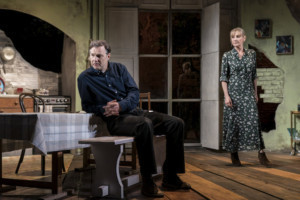Review: THE END OF HISTORY..., Royal Court

![]() Harry Potter and the Cursed Child's creative dream team are reunited for another new venture - although this drama's family doesn't come with an in-built, wand-waving fanbase. Instead, it's a personal work from writer Jack Thorne, who based the play's ideologically committed Sal and David on his own parents.
Harry Potter and the Cursed Child's creative dream team are reunited for another new venture - although this drama's family doesn't come with an in-built, wand-waving fanbase. Instead, it's a personal work from writer Jack Thorne, who based the play's ideologically committed Sal and David on his own parents.
It's perhaps not the most flattering of portraits, given the combative nature of this clan - initially a source of cringe-comedy humour, later more overtly suffused with pain and grief. The play begins in Tony Blair-era 1997, and then jumps forward 10 years for each of its two consecutive acts. But the set-up is similar for all three: an edgy family reunion in their Newbury kitchen, with an increasing clash of values and personal slights.
The title refers to political scientist Francis Fukuyama's theory that with the post-Cold War spread of liberal democracy and free market capitalism, we had reached the "end of history" - a final form of government. Lifelong socialist campaigners Sal and David initially feel a sense of victory, but that soon switches to betrayal by Blair, and betrayal too by their children, who - despite being named after Karl Marx, Polly Hill and Thomas Paine - choose career paths that seem a world away from their own beliefs.
That leads to a fascinating decision in the second act, but the time-hopping structure and a huge swerve in tone means we don't really explore all its implications in full. The generational battle over inheritance, inequality and what we owe to one another also feels overly familiar as a theatrical premise - not least as a kind of left-wing partner to Mike Bartlett's Love, Love, Love of 2012, also at the Royal Court.
The always engaging Lesley Sharp and David Morrissey bring some humanity to the otherwise abrasive baby boomer parents, who either lecture while oversharing about their sex life (Sal) or lecture while pointing out failings in their children (David). Inverse snobbery leads them to treat their son Carl's "posh" girlfriend Harriet cruelly, and to cripple the psyche of Cambridge-educated daughter Polly - who becomes a self-loathing corporate lawyer.
This is a play of extremes, which better serves the (dark) comedy than the drama. There are fixed binaries - if you're politically committed, of course you can't cook - and certain parenting choices are only put in context retrospectively, in a slew of climactic information. It's difficult to get a handle on the characters as people (never mind a convincing family), rather than as contrasting points in a sociopolitical seminar.
The exception is perhaps Tom, youngest child and the one least able to cope with this domestic war zone. A rich performance from Laurie Davidson conveys his simultaneous vulnerability, shame, anger, hurt and yearning. Glimpses of his experience - including mental health struggles - suggest he would make an excellent focus for another drama, but he's rather sidelined in this one.
The excellent Kate O'Flynn plays beautifully off Davidson in their scene together. It's the one that feels most organically like a portrait of family, with both mutual teasing and subtle support. Elsewhere, O'Flynn is landed some of the blunter lines in the play, as Polly is nearly always placed in fierce opposition to someone.
That element of the play proves exhausting, with even gentler middle child Carl (Sam Swainsbury, AKA Mum's Jason) and initially eager-to-please Harriet (Zoe Boyle) getting in some nasty jabs. There's a point at which you question the toxicity of these family gatherings - and why on earth Harriet would stick around for them.
The political framework also feels a bit meandering. We have references to events, from Greenham Common through to Brexit, but the play never really builds to a revelatory point - other than perhaps musing on liberal disillusionment and the militancy of belief. Yet the latter is undercut by a hagiographic (if movingly delivered) speech, which skews the argument; it's more interesting when the concept of doing better or being your best self remains subjective.
John Tiffany's production is still a pleasure, with its Steven Hoggett-choreographed dancing scene changes, during which passing time is signalled by tearing off pages from the wall calendar. Grace Smart's evocative set is a domestic space with chunks ripped out of the walls; later, suffused with sunlight (lovely work from Jack Knowles), the opening of the French widows is like the whole house releasing a breath.
Yet for all its slick delivery, this is a play that makes its points erratically, and with too little support from character development. In some ways, it feels closer to a pilot episode or a pitch - more the beginning than the end.
the end of history... is at the Royal Court until 10 August
Photo credit: Johan Persson
Reader Reviews
Videos

